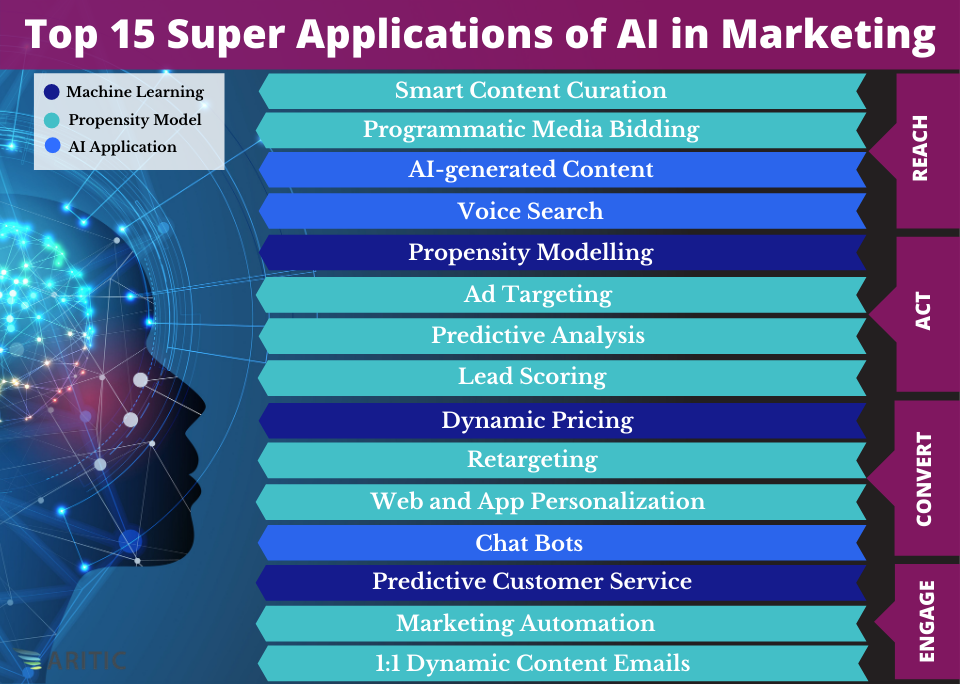Headways in Artificial Intelligence (AI) are changing the ways we work. We are witnessing applications of AI as a firm reality. A significant fundamental shift is happening in almost every sphere, and AI in Marketing is no exception.
Applications of AI in marketing is becoming the newest way for marketers that involves data-driven marketing strategy.
Jump Directly to
1 . The Importance of Marketing in an AI-Driven World
2. Applications of AI in Marketing
3. What are the Top Challenges of AI in Marketing?
You can understand AI as Digital Superintelligence in the form of powerful computing. AI can work on its own by using new or historical data and performs human-like tasks. Well, that is the most generic definition of Artificial Intelligence.
Applications of AI in marketing makes it possible for marketers like you to plan and implement creative marketing strategies that are more personalized and have a human element. These strategies will usually be optimized to delight customers and turn them into loyal brand advocates.
Still Not an User of Aritic PinPoint Automation?
AI technologies simplify, where it will look at all the new information and present to your customers more valuable information knowing their interests.
More than 20% of marketers currently use AI-based applications, with an additional 57% planning to use them in the near future.
In this article, we will discuss the relevance of the AI-driven world for marketing as a whole. Also, we will look into applications of AI in Marketing.
The Importance of Marketing in an AI-Driven World
Artificial Intelligence must be perceived as a tool to drive marketing initiatives of achieving goals with a higher degree of precision.
AI will inevitably help marketers combine advanced technology and human creativity to read, understand, and engage with modern consumers at the individual level with hyper-personalized, relevant, and timely communications.
As a de-facto of applications of AI in marketing, you’re going to have to work more with data sets and data analytics as a marketer.
Data scientists may not understand marketing, and the marketer might not understand data science. But as the future paints the picture of an AI-driven world, the two will have to work together to understand the parameters of use cases, the data required to optimize them, and how that data will be acquired, governed, and used.
There may be bias in datasets that need to be tackled effectively, and marketers will play a vital role in ramping up in all of these areas.
A fact, although, is that AI in marketing is not set-it-and-forget-it. Changes happen, and changes may happen in unexpected ways- AI may become less impactful over time.
You’ve got to continuously monitor it and understand that many of the assumptions and models used to deploy AI will change over time.
Your customers will change. The products will change, and Market regulations may change. Therefore it is evident that AI in marketing is going to require constant remodeling and updation. To be specific, it is safe to say that supervision and adaptation will be compulsory for AI.
Applications of AI in Marketing
Leveraging on AI, marketers segregate customers into core groups by segmenting them based on highly-targeted niches. They no longer create a single generic ad campaign to reach all types of their target customers and look forward to better conversion.
Instead, they create more tailored marketing content that targets each core group based on their specific patterns and interests.
AI is not perfect. Well, neither are we. However, its scale, dynamism, and capacity enable marketers to rethink and develop better strategies to deliver services to their customers in tangible and relevant ways throughout customer lifecycles.
Below I have enumerated approaches for applications of AI in Marketing and ways in which AI makes marketing better.
Execute Effective Marketing Automation Workflows Now

1 . Reach
Smart Content Curation
The most overlooked applications of AI in marketing- AI content curation.
AI content creation governs machine-created content and automated personalization for the customer journey. AI-powered content curation allows you to engage visitors better and stay on top of their minds by providing them relevant content and extra value while putting forward your industry experience. It has n numbers of uses, such as personalizing messaging and better recommendations to users.
AI eases the content creation process, but the human force is still critically important. For instance, Marketers will be needed to create editorial calendars, choose types of visual elements, and bring the right visual elements with the right messaging.
AI-powered content curation can prove to be an elixir for subscription-based services.
Data plays a vital role through machine learning algorithms and enhances recommendations patterns of content served to users. For example, Amazon’s Prime Video and Netflix employ a robust recommendation system to tweak recommendations as per user’s viewing history on their platforms.
Programmatic Media Bidding
Programmatic Media Bidding refers to the automated bidding process of buying and selling online ad spaces. These are technology-based models that inherit machine learning traits, use the audience’s data, and show relevant ads for target customers. Since AI algorithms and machine learning are backing such models, it eliminates human error chances and provides more efficient audience data and scales display advertising.
Algorithms effectively analyze a site visitor’s behavior to adapt it and then serve up personalized ad content almost instantly. Such information is continuously gathered and used to inform future optimizations for ad content creation.
AI will enable Ad sellers to focus more on outcomes and help their clients achieve more significant ROI through personalization by utilizing personal and behavioral data. Through AI, psychographics will play a role in giving more profound insights into the goals, needs, and purchasing patterns that drive customers in their decision-making for opting for a product or service.
AI-generated Content
Isn’t it incredible that AI can create content from scratch? Well, of course, it will require data to generate content but perhaps, AI content creation is now more sophisticated. AI lets you create better content experiences for your audiences. It can write reports and news based on data and information fed to them.
AI-generated content can save you a lot of time. You can fine-tune your content for each core group within your target audience and enjoy a competitive advantage. You can optimize your content marketing strategy leveraging AI.
Though AI cannot entirely take over your content creation process, it is still useful for smaller tasks like generating social media posts. Thus, it is a perfect example of applications of AI in marketing.
Voice Search
Everyone is familiar with Alexa, Cortana, and Siri. They are virtual assistants and work on speech recognition technology to assist users with their voice searches. Voice search is AI-based technology and can let marketers improve future SEO strategies. It is tremendously helpful in generating more traffic and enabling customer retention.
Voice SEO has already taken over online search majorly, which means it is as essential to optimize voice as it is otherwise. Voice search is now present in various mediums such as phones, virtual assistants- Siri, Google Home and Alexa. By optimizing voice search, you will tremendously target a colossal group of prospects.
As a marketer, you will always have to keep in mind that voice search is not similar to a traditional search. SEO for voice search requires a more refined approach. It would be best to make sure that Voice SEO must be closely related to your products or brands.
2 . Act
Propensity Modelling
Propensity Modelling or more dearly known as Predictive Analytics is another aspect of applications of AI in marketing that benefits marketers. Propensity Modelling is a form of analysis using data, statistical algorithms, and the most brilliant AI technologies to predict future trends. While AI technologies analyze more and more data, they tend to learn ways over time to improve their results and provide the best solutions.
Propensity Modelling enables marketers to understand customer behaviors and trends, predict future outcomes, and optimize their campaigns accordingly.
Ad Targeting
Machine learning algorithms on top of AI can analyze large amounts of customers’ historical data to establish which ads suit which customer and at what stage in the buying process. Using trends and data, AI can serve you as a marketer with the optimization benefits to deploy content at the right time.
People like to see ads that relate to them or address their problems. By tailoring targeted ad tactics to suitable customers, marketers can ensure that they’re communicating with the right customer core groups that are most likely to take action and respond well to the advertisements put in front of them.
Fortunately, Marketers can achieve this by using the digital superintelligence of AI models and algorithms. You can reap-in the full advantages of artificial intelligence in targeted marketing campaigns to let you use ad targeting.
Predictive Analysis
While many of us might be great at extracting insights from large chunks of data, most of us lose a lot of time when extracting usable information from complex data. AI can extend its helping hand for you in such scenarios to ease your work and save you time.
Predictive analysis as applications of AI in marketing can unleash a power pull across our marketing initiatives. Predictive analysis powered by AI can utilize already available data and excavate immense value from it for you to draw insights. AI predictive analysis will help you diagnose your website by letting you know what is right or wrong. It can help you predict what your target audience is looking for solutions for or what they want to buy.
Lead Scoring
Lead Scoring is the method of determining lead worthiness and involves ranking leads based on their actions and engagement patterns in their buying journey. Specifically, The more qualifying the lead’s actions, the more the score will rise for that lead. It is just like providing grades to students based on their activeness and performance in a school examination. And then conclude who is Splendid, who is Fair, or who is Flop.
AI-backed Predictive lead scoring is one of the hot applications of AI in marketing. It is a new way of prioritizing and scoring leads. Marketers will continue embracing the predictive algorithm-based lead scoring method because this method relies on aggregated data and predicts a lead’s value in advance that is a perfect model for success.
3 . Convert
Dynamic Pricing
Have you noticed that while you are booking a flight online, how often do their prices change? Have you seen price changes of a product you viewed on an online shopping platform?
There are two reasons as to why this happens-
- Due to fluctuations in demand and supply
- AI learns what you are interested in through tracking and analytics
Dynamic pricing is when intelligent algorithms work behind a flexible pricing strategy based on current market demands and customer trends. Dynamic pricing also refers to time-based pricing or demand pricing.
Businesses exercise dynamic pricing modules to arrive at optimum pricing for their products or services to stay competitive and improve their margins quickly. AI-controlled dynamic pricing modules enable them to price their services correctly, even in narrow time-frames. It is one of the most lucrative applications of AI in marketing.
Retargeting
If you are fond of buying eCommerce products online, you must have experienced this- You visit an eCommerce app or website, browse for products, look for options but don’t buy the product. When you browse other websites or apps, you get bombarded with ads of that product you were viewing or have wishlisted.
The above scenario is that of retargeting, where you serve targeted ads to prospects once they showed interest in your products or services. While it may be slightly off for some prospects, but generally, it works because there might be some other reasons why a prospect may have checked out but not successfully made the transaction.
AI in marketing is super helpful in carrying out retargeting tactics. Employing Machine learning (ML) and deep learning algorithms, AI continuously analyzes prospects’ behavior, purchases history, and identifies trends. Through ML, it can distinguish well between buying, actual conversion, and exploring behavior, enabling you to retarget prospects with a higher probability of moving them to the conversion phase.
Using Digital superintelligence or AI, you can exercise smart marketing, dynamic retargeting, and leverage the treasure of the user’s valuable insights to retarget them effectively.
Web and App Personalization
Web and App Personalization is directly related to optimizing customers’ experience and helping them quickly get to their goals. Applications of AI in marketing open the door to tailoring a website or app’s services and content is the first step towards driving personalized marketing campaigns and creating a meaningful engagement for customers.
By tailoring services and content of a website or app, it means to match the audience’s interests, thereby positioning them towards the conversion phase. With a proactive marketing automation tool powered by AI, you can map the customers’ journey by analyzing their interests and behavior. You can then serve them with the most relevant content, deliver appropriate messaging at the right time, and inform them about your products and services’ benefits. Besides this, you can pay attention to microelements of content to get traction to stand out and fetch meaningful customer engagement.
Chat Bots
Chatbots are text-based or voice-based AI-driven interfaces or rule-based interfaces that simulate human intelligence by interpreting customers’ queries and completing orders for them. ChatBots can wear many hats as they are great at providing customer service, interpreting customer queries, solving problems quickly, completing customer orders, and generating leads.
AI chatbots utilize Natural language processing(NLP) and machine learning to continuously evolve and turn smarter over time. These are extensive, flexible, and intelligent and provide a more lifelike experience to users. Chatbots are valuable for businesses as it is an incredible data gathering tool, significantly reduce staffing needs, and reduces barriers.
4. Engage
Predictive Customer Service
Propensity modeling predicts which customers are most likely to unsubscribe from your service by analyzing what features are most common in customers who show unsubscribe symptoms. It is easier to reach out to these groups of customers to extend offers, prompts, and assistance to gauge them from churning.
AI lets you provide intelligent, easy, and convenient customer service to customers at any point during the customer journey. It is significant for integrated and optimal customer experience.
Marketing Automation
Marketing automation techniques revolve around automating repetitive marketing tasks and activities. It is specifically a series of rules, which, when triggered, initiates interactions with leads. Marketing automation tremendously helps generate new leads, nurture existing leads, and effectively measure marketing success upfront.
Applications of AI in marketing is specifically critical for marketing automation too. Through machine learning, AI gathers and processes customer data lightning quick and can apply those insights at a very massive scale. It is faster to segment, sort, and prioritize all this information using AI.
AI-driven marketing automation platforms are radically changing marketing automation strategy. These are next-gen platforms that promise improved marketing game plans by meeting the shape-shifts like demands like hyper-personalized services for customers. When added to marketing automation platforms, artificial intelligence enables marketers to quickly identify qualified leads, create smarter nurturing strategies, and generate relevant content.
1:1 Dynamic Content Emails
Email Marketing remains intact as the best marketing asset for businesses. The ultimate aim of email marketers is to boost open rates by driving email campaigns that resonate better with subscribers. Your subscribers can not have similar interests, needs, or pain points. They will have distinct concerns and expectations altogether that you can effectively address using one-to-one Dynamic content emails.
Dynamic content emails, especially one-on-one emails, are most successful as it employs contextual emails that galvanize what your brand has to say and target what your subscribers are interested in hearing. Dynamic content techniques ensure that your emails remain relevant for your subscribers based on their geo-locations and psychographics, as well as behavioral data and insights.
AI can help you analyze the data and insights generated from Machine Learning, and then you can create highly personalized one-on-one dynamic emails.
Here propensity modeling works wonders as it allows you to personalize sections of your newsletters and display relevant content in the newsletter that humanizes your subscribers’ experience.
What are the Top Challenges of AI in Marketing?
Be it Elon Musk working behind the idea to get humans on Mars or Mark Zuckerberg proclaiming that the future of work is to overcome physical barriers and enter the phase of virtual reality (VR) and Augmented Reality (AR).
All these possibilities depict the same picture; Technology doesn’t grow old as it keeps its pace of turning better and bold.
But every technological advancement brings its proviso and challenges. Applications of AI in marketing is rising but is reciprocated by some challenges it throws our way. Artificial Intelligence obliges to the same path and poses some big questions before us. Let’s find out what those questions or challenges are.
1 . Insufficiency of computing power
Artificial Intelligence is meant to scan vast amounts of data and perform a plethora of calculations. Machine learning and deep learning as AI components require robust hardware and a lot of processing power to perform calculations quickly.
Such strong IT infrastructure costs over the top to the organizations and can thus hinder smaller organizations from adopting AI to yearn for success.
Cloud-based solutions and Next-Gen computing systems may be the answer to such bottlenecks for smaller organizations. In contrast, large organizations can develop and run their next-gen computing system to scale their AI success.
2 . Limited Talent
AI is no more a novel amongst technology enthusiasts, researchers, and students. But there are only a handful of people aware of the potential and advantages of AI. Then there are huge skill gaps when it comes to AI. These vents of skill gaps are widening instead of getting contracted.
Though interest in AI has swelled slightly, data science courses focusing on AI development- have become prevalent. But still, more talented people will be required to enable every business to enter the AI bubble. Now is the perfect time for people who’re looking to move into the technology domain or want to change jobs within this AI bubble. Keeping a constant watch on the current trends can help potential candidates by putting them on the right path toward establishing a thriving career in the technology industry. It can also help companies assess the market and find the required talent for their job roles.
3 . Fostering Trust
AI is still a novel technology for many people. Fostering trust for AI amongst them will not be easy. People are reluctant to trust if they are not given answers to how AI models make decisions. The complexity of how deep learning models arrive at any output is usually mysterious for the general public.
Businesses need to take heed when employing AI-driven software as some applications may be too accurate for consumers. For instance, Recommendation engines, while being powerful marketing tools, can feel intrusive to some consumers if it appears to know them too well.
4. AI perspective is changing
Artificial Intelligence is revolutionizing the marketing environment. Future beholds significant changes as far as applications of AI in marketing is concerned. Enabling marketers to understand the sales cycle better, correlate theories, and scale strategies. Machine learning, Big data, and AI will assist marketers in analytics, forecasting, and various optimization tasks.
⭐ What is AI in digital marketing?
AI is the use of technology to perform tasks that normally require human intelligence. In the context of marketing, artificial intelligence helps us achieve specific goals. For example, we can use AI to make personalized ads for users based on their interests. This allows businesses to target users more effectively.
⭐ What is an example of curated content?
Curated content is a strategy of gathering, organizing, and presenting information in a meaningful way. It’s an effective tool to engage your target audience with well-selected information.
⭐ What is ad targeting called?
Ad targeting is the process of associating an ad with a specific group or audience. It can be done by various methods such as keywords, geotargeting and behavioral targeting.
⭐ Do targeted ads use AI?
Yes, Targeted advertising uses algorithms to track user behavior and apply it towards future ads they will see. The use of AI can help predict trends, improve performance and personalize the customer experience.
⭐ What is lead scoring in machine learning?
Lead scoring is a technique that machine learning employs to help categorize leads and then create the best lead nurturing touchpoints. Using lead scoring, you can create a more effective sales pipeline by prioritizing your time on high-value opportunities using readily available information from your CRM.
⭐ What is dynamic email template?
Dynamic email templates are an innovative way to capture the attention of customers. The templates can be customized according to customer preferences. They are also interactive and engaging, making the email experience more personal.
⭐ Is dynamic email safe?
Static emails are designed for a specific set of recipients, while dynamic emails are sent to every person on the mailing list. Dynamic emails have increased risk because of their increased vulnerability. You need to be careful when using dynamic content. Otherwise, you might lose your customers’ trust and get penalized by Google for sending spammy emails.
⭐ Why is dynamic content important?
Dynamic content is what makes a website more interesting and engaging. It is the basis for any digital marketing campaign. The more engaging the content, the better it will perform on social media and search engines.




1 Comment
Great list Ankit. As a marketing analyst this is extremely helpful for me. I look forward to implementing these solutions.